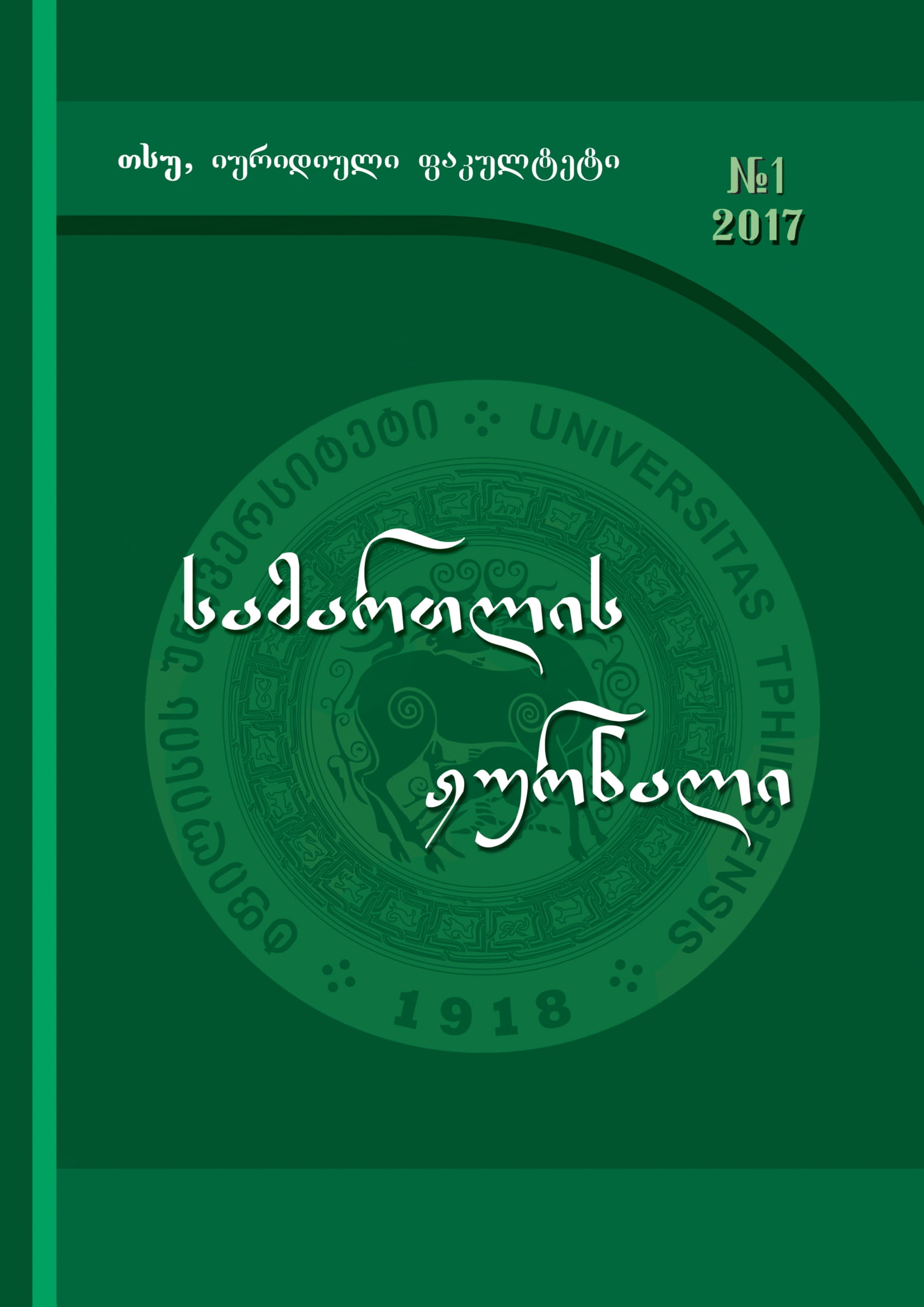ადამიანის უფლებების დარღვევები და საზოგადოებრივი მორალი GATT-ის XX(ა) მუხლისა და GATS-ის XIV(ა) მუხლის მიხედვით**
საკვანძო სიტყვები:
მსოფლიო სავაჭრო ორგანიზაცია, ადამიანის უფლებები, საზოგადოებრივი მორალი, აუცილებლობის ტესტი, GATT-ის XX (ა) და GATS-ის XIV (ა) მუხლების ქუდი .ანოტაცია
სტატიაში განხილულია ადამიანის უფლებებისა და საერთაშორისო სავაჭრო სამართლის ურთიერთმიმართების პრობლემა. ნაშრომი არკვევს, არის თუ არა განდევნილი ადამიანის უფლებები საერთაშორისო სავაჭრო სამართლიდან იმდენად, რომ შეუძლებელი ხდება, შეეცილო ვაჭრობის ისეთ შემზღუდავ ზომას, რომელიც ტარიფებისა და ვაჭრობის გენერალური შეთანხმების (შემდგომში – GATT[1]) XX(ა) და მომსახურებით ვაჭრობის შესახებ გენერალური შეთანხმების (შემდგომში – GATS[2]) XIV(ა) მუხლებით დაშვებულია როგორც საზოგადოებრივი მორალის დამცავი ზომა, მაგრამ, რომელიც, ამავდროულად, ეწინააღმდეგება ადამიანის უფლებებს. ნაშრომი ამტკიცებს, რომ საერთაშორისო სავაჭრო სამართალი ვერ უზრუნველყოფს ადამიანის უფლებების ეფექტურ დაცვას, ვინაიდან ადამიანის უფლებები არ არის მოქმედი სამართალი მსოფლიო სავაჭრო ორგანიზაციის ფარგლებში, ამასთან, GATT-ის XX(ა) და GATS-ის XIV(ა) მუხლების სამართლებრივი კონსტრუქცია არ გამორიცხავს ვაჭრობის ისეთ შემზღუდველ ზომებს, რომლებიც ეწინააღმდეგებიან ადამიანის უფლებებს.
[1] General Agreement on Tariffs and Trade
[2] General Agreement on Trade in Services.
წყაროები
UN Charter (1945).
Vienna Convention on the Law of Treaties (1969).
General Agreement on Tariffs and Trade (1994).
The General Agreement on Trade in Services (1995).
Understanding of Rules and Procedures Governing the Settlement of Disputes (1994).
Understanding of Rules and Procedures Governing the Settlement of Disputes (1994), Appendix I.
International Law Commission, Fragmentation of International Law: Difficulties Arising from the Diversification and Expansion of International Law, UN GAOR, 5 81h sess., UN Doc. A/CN.4/L.682 (13 April 2006) 28-9 [45] (ILC Fragmentation Report).
Charnovitz S., The Moral Exception in Trade Policy, Vanderbilt Journal of International Law, №38, 1997, 742.
Diebold N.F., The Morals and Order Exceptions in WTO Law: Balancing the Toothless Tiger and the Undermining Mole, Journal of International Economic Law 11(1), 2007, 51-52.
Doyle C., Gimme Shelter: The “Necessary Element” of GATT Article XX in the Context of the China –Audisovisual Products Case, Boston University International Law Journal, №29, 2011, 152.
Feddersen C.T., Focusing on Substantive Law in InternationalEconomic Relations: The Public Morals of GATT's Article XX(a) and "Conventional" Rules of Interpretation, Minnesota Journal of Global Trade , №7, 1998, 112-114.
Flores Elizondo C.J, Case Comment, Manchester Journal of International Economic Law, Vol. 11, Issue 2, 2014, 319-320.
Guzman A.T., Pauwelyn J., International Trade Law (New York: Wolters Kluwer Law & Business), 2012, 417-418.
Hilpold P., WTO Law and Human Rights: Bringing Together Two Autopoietic Order, Chinese Journal of International Law, №10, 2011, 355, 356, 354-357.
Howse R., Langille J., Permitting Pluralism: The Seal Products Dispute and Why the WTO Should Accept Trade Restrictions Justified by Noninstrumental Moral Values, The Yale Journal of International Law, Vol. 37, 2012.
Kanade M., Human Rights and Multilateral Trade:A Pragmaic Approach to Understanding the Linkages, The Journal Jurisprudence, 2012, 396.
Marceau G., WTO Dispute Settlement and Human Rights, European Journal of International Law, №13, 2002, 764, 791-795.
Marwell J.C., Trade and Morality: The WTO Public Morals Exception After Gambling, New York University Law Review, Vol. 81, 2006, 806, 820-823
Nachmani T.S., To Each His Own: The Case for Unilateral Determination of Public Morality under Article XX(a) of the GATT, University of Toronto Faculty of Law Review, № 71, 2013.
Pauwelyn J., Squaring Free Trade in Culture with Chinese Censorship: The WTO Appelate Body Report on China – Audiovisuals, Melbourne Journal of International Law, №11, 2010, 135.
Petersmann E.U., Human Rights and International Economic Law in the 21st Century. The Need to Clarify their Interrelationships, Journal of International Economic Law, 4(1), 2001.
Powell S.J., The Place of Human Rights law in World Trade Organization Rules, Florida Journal of Iternational Law, №16, 2004, 220-221.
Schultz J., Ball R., Trade as a Weapon? The WTO and Human Rights-based Trade Measures, Deakin Law Review, №12, 2007, 43.
Wu M., Free Trade and the Protection of Public Morals: An Analysis of the Newly Emerging Public Morals Clause Doctrine, Yale Journal of International Law, №33, 2008, 232, 243.
Yarwood L., Trade Law as a Form of Human Rights Protection?, NUJS Law Reviw, 3, 2010.
Yigzaw D.A., Hierarchy of Norms, The Case for Primacy of Human Rights WTO Law, Suffolk Transnational Law Review, 2015, 40.
Zagel G.M., Human Rights Accountability of the WTO, Human Rights and International Legal Discourse, 1, 2007, 340-355.
EC – Seal Products, WTO Panel Report, 2013.
China – Publications and Audiovisual Products, Panel Report, WTO, 2009.
EC – Approval and Marketing of Biotech Products (complainant United States of America), Panel Report, WTO, 2006.
Mexico Tax Measures on Soft Drinks and Other Beverages, Appellate Body Report, WTO, 2006.
US-Gambling, AB Report, WTO, 2005.
US-Gambling, Panel Report, WTO, 2004.
Omega Spielhallen- und Automatenaufstellungs-GmbH v Oberbürgermeisterin der Bundesstadt Bonn, Case C-36/02, European Court of Justice (First Chamber), 2004.
EC-Asbestos, Appellate Body, 2000.
Korea — Various Measures on Beef, Appellate Body, 2000.
US-Shrimp, AB Report, WTO, 1998.
GabCikovo-Nagymaros Project (Hungary/Slovakia), Judgment, 1. C. J. Reports 1997.
Handyside v United Kingdom, Application №5493/72, ECtHR, 1976.
ჩამოტვირთვები
გამოქვეყნებული
როგორ უნდა ციტირება
გამოცემა
სექცია
ლიცენზია
საავტორო უფლებები (c) 2023 Nino Rukhadze

ეს ნამუშევარი ლიცენზირებულია Creative Commons Attribution-ShareAlike 4.0 საერთაშორისო ლიცენზიით .








